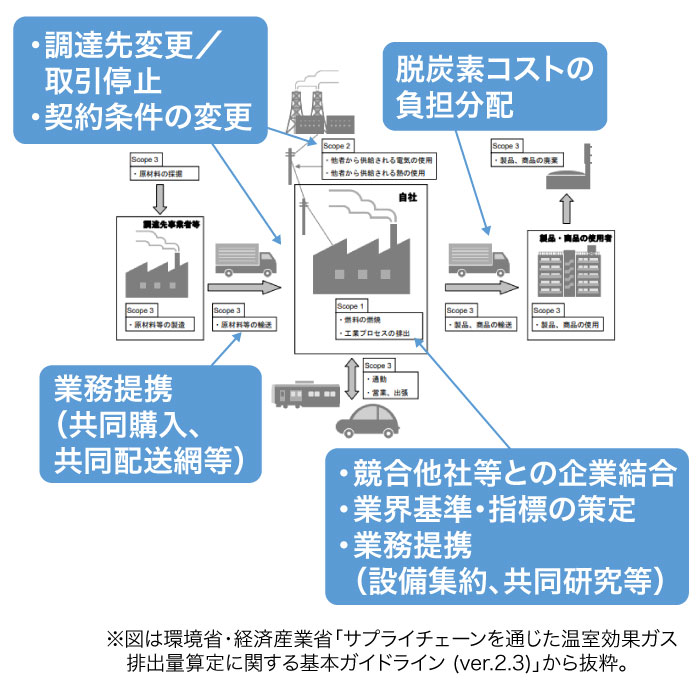Is inter-company collaboration for decarbonization a violation of the Antimonopoly Act? The creation of new guidelines for green and competition law is being considered in Japan as well

In order to achieve decarbonization, it is essential to collaborate with companies in different industries, such as building large-scale supply networks for the recovery, utilization, and storage of hydrogen, ammonia, and CO2. However, sometimes initiatives such as corporate mergers can be subject to antitrust and other competition laws. What should be the competition law in the decarbonized era? Full-fledged discussions have begun in Japan as well regarding the review of competition policies that are progressing in Europe.
Why should the antitrust law be revised?
In Europe, decarbonization moves toward exemption from cartels
Why should the antitrust law be revised?
Decarbonization is a public interest goal that should be pursued by society as a whole.
In fact, companies divide scope into 1, 2, and 3 from the perspective of disclosing non-financial information, and work on how to reduce CO2 emissions throughout the entire supply chain. Scope 1 is how to reduce CO2 emissions from your company. In order to reduce production, we will work with competitors to consolidate facilities and integrate production. Alternatively, regarding technology development that requires a large amount of research costs, it is assumed that there will be a move to accelerate innovation through joint research.
Scope 2 is emissions from the use of electricity and heat supplied by others, while Scope 3 is emissions generated within the supply chain other than Scopes 1 and 2. Expanding to Scope 2 or 3 will result in a wide range of corporate activities. Alternatively, business alliances such as joint purchases and joint deliveries will likely progress.
Furthermore, there will certainly be discussions in the future about how the entire supply chain should bear the enormous cost of decarbonization.

Image of Scope 1, Scope 2 and Scope 3 in supply chain emissions
Source: Re-edited by the editorial department based on materials from the Ministry of Economy, Trade and Industry
However, in an increasingly oligopolistic market, no matter how decarbonized an initiative may be, business integration between competitors could violate antitrust laws or be viewed as a cartel. In particular, decarbonization will lead to an increase in electricity bills and raw material costs, which is extremely likely to lead to higher product prices. If a company with a dominant position subcontracts or demands an unreasonable price increase from consumers, using the public interest of green as a shield, it will violate the Antimonopoly Act.
On the other hand, there is a growing global debate about how to achieve decarbonization in the so-called “hard to abate” industry. In Japan, this applies to industries such as steel, chemicals, cement, paper and pulp, which use fossil fuels in their manufacturing processes, are difficult to electrify, and are difficult to achieve zero CO2 emissions with existing technologies and raw materials alone.
For these hard-to-abate sectors, decarbonization will have a major impact by reshaping the manufacturing process from the ground up. For example, just by building a hydrogen supply chain that does not emit CO2 even if it is ). This is an investment amount that cannot be covered by a single company.
For decarbonization, cross-industrial collaboration with companies, startups, industry groups, academic institutions, etc. that were not considered competitors in the past, and data sharing such as non-financial information are indispensable. In other words, without new approaches that allow companies to tackle antitrust and other competition laws without daunting them, ultimate goals like decarbonization will be difficult to achieve.
What should be the competition policy in the decarbonized era? On March 25, the Ministry of Economy, Trade and Industry set up a competition policy research group aimed at realizing a green society, and began full-scale discussions on whether competition laws such as the Antimonopoly Act should be reviewed.
In Europe, decarbonization moves toward exemption from cartels
Europe is taking the lead in reviewing and discussing how antitrust laws should be applied to companies working to decarbonize.
In 2013, several power producers in the Netherlands agreed to shut down five coal-fired power plants built in the 1980s in an effort to cut CO2 emissions by 80-90% by 2050 (at the time). However, the Dutch authorities decided that the ban on cartels would be violated because it would reduce energy production capacity and increase the price of power purchases. The agreement was rescinded.
This decision has been criticized not only by power generation companies but also by environmental protection groups, saying that competition policy is a barrier to green policy. In July 2020, the Dutch government released draft guidelines for new competition policy in response to growing public opinion toward decarbonization. European competition law stipulates that there are four requirements that must be met in order for joint conduct between companies that violates cartel regulations to be exempt from competition law. One of the conditions is that the benefits consumers receive from the joint action must fully compensate for the losses consumers suffer from the joint action.
However, the Dutch guidelines state that there are good grounds for deviating from the basic principles of European competition law when agreements between companies concern environmental damage and support compliance with international standards or the realization of policy objectives. did. In other words, it stipulated that there is no need to completely compensate for the harm suffered by consumers through joint actions.

The guidelines are still in draft stage, but in February 2022, Dutch authorities confirmed two cases in which a deal between competitors did not violate cartel regulations. One is the joint purchase of wind power, and the other is agreement among distribution companies on CO2 emission prices.
In Germany, in January 2019, Germany's Federal Cartel Office temporarily banned the integration of production of plain bearings used in wind turbines and ships, citing competitive disadvantages. However, in August 2019, the Minister of Economy and Energy approved a reversal, stating that "the joint venture can introduce renewable energy and reduce the fuel consumption of large marine engines."
In September 2021, Austria amended its competition law to make it legally clear that contributions to decarbonization are a factor for exemption from cartel regulations.
On the other hand, even in the field of decarbonization, it is universal that competition promotes innovation. In particular, every country is strictly dealing with hardcore cartels and greenwashing, which pretends that companies are environmentally friendly. In 2021, the European Commission announced that five German automakers, including Daimler, were able to develop excellent purification performance in the development of exhaust gas control technology for diesel engines. recognized as a cartel. Under the cover of green, collaboration between companies that hinders consumer interests and innovation will continue to be severely cracked down.
Decarbonization is forcing material industries such as steel, chemicals, cement, paper and pulp, which have been the basis of Japan's industrial competitiveness, to rebuild their supply chains. What kind of actions do not violate the Antimonopoly Act in order to prevent such industries from atrophying and to work on green? It is necessary to clarify conditions and formulate guidelines. The study group plans to collect knowledge from Europe and other countries and prepare how to apply competition laws in the decarbonized era.






